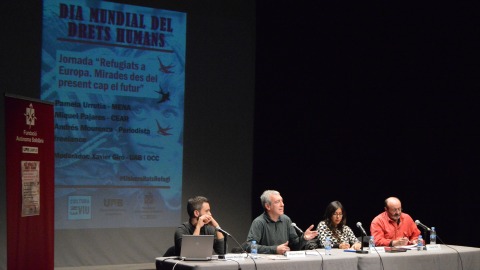In the Human Rights Day event, answers were provided for the future of refugees

11/12/2015
As a consequence of the radicalization and the stagnation of the military conflict in different countries of Africa or the Middle East, the flux of refugees that are trying to get to Europe has significantly increased, especially in the case of those coming from Syria.
Syria had 22 million inhabitants at the beginning of the war. Around 13 million, according to ACNUR, have been forced to leave. 8 million people have had to move inside the borders of their own country and 4.1 million have fled. This is the total of refugees that ACNUR estimated that are now in neighbor European states.
On the occasion of the International Human Rights Day, the Solidarity Autonomous Foundation andCultura en Viu dedicated last Thursday 10 December to discuss the following issue: "Refugees in Europe. Looking from the present to the future". There was a round table, which 70 people attended, and it was conducted by experts on refugee migrations, conflicts and peace processes seen from different perspectives. The speakers of the event were Pamela Urrutia, journalist specialized in the MENA region (Middle East and North Africa) and researcher in the School for a Culture of Peace of the Universitat Autònoma de Barcelona, Andrés Mourenza, freelance journalist, and Miquel Pajares, president and member of the Spanish Commission for Refugee Aid. The round table was moderated by Xavier Giró, a professor of political journalism at the UAB and director of the Research Group Observatory on the coverage of conflicts (OCC).
Pamela Urrutia opened the session with a brief introduction of the type of geopolitical context which forces people who live in territories with a military conflict to flee, emphasizing the case of Syria, the country with more displaced people in the world. The researcher also emphasised that Daesh (ISIS) is not the civil population's only enemy, because what today has turned into an international conflict for the dominion of the region started as a series of popular revolts against the regime that were severely suppressed by Al-Assad and that triggered an internal armed conflict. Since then the regime has allowed, the researched says, "the use of chemical weapons" and "has carried out war strategies like the use of hunger in regions controlled by other armed groups in order to put pressure, and the use of "sexual violence".
According to Urrutia, "the increase in the number of people who leave Syria is due to the fact that refugees do not see anything that points to the end of the war or to a decrease in violence in the country" and they find "difficulties in the neighbouring countries in order to offer their families a better life". The researcher concluded with an analysis of the dimension of the conflict in terms of gender, making a reference to "the increase in marriages of under-age girls as a means to guarantee their safety", the "sexual blackmail in exchange for money or security" and the "sexual violence" to which the young women in a displacement situation like this are often subjected.
The freelance journalist Andrés Mourenza referred to the "alarm" of the refugees in the media as means to "sell human stories for the summer", even though he says this "tendency has been going on for years". The journalist explained that the neighbouring countries to the areas in conflict have taken in the refuges, but in most cases they have not granted them the same rights as the rest of the population. Mourenza pointed out that in Turkey the Syrian refugees are legally "temporary guests", and even though they have rights to education and health, the refugees often encounter difficulties to exercise those rights. For example, he said, "only 14% of the refugees end up having access to education". The journalist also said that many Syrian refugees in Turkey live on charity or have an irregular economy, and are exploited by the textile and agricultural industry.
Going back to the reception of refugees by the neighbouring countries, Miquel Pajares, president of CCAR, criticised the hypocrisy of the Member States of the European Union for their financial capacity to take in refugees: "According to ACNUR, approximately 400,000 refugees have entered the UE, one fifth of the refugees that Turkey has taken in, and all the Member States are richer than Turkey". Pajares also referred to the media for the distortion of the words “refugees” and “illegal immigrants". According to Fontex, he stated, 80% of the "immigrants" that entered through the Mediterranean in 2004 were "refugees".
Miquel Pajares coincided with the other speakers that the Member States of the European Union violate the charter of the Geneva Convention of 1951, in which they committed to take in refugees who flee their country when their lives are in danger because of a military conflict. The CCAR president stated that the majority of refugees often pay mafia organizations because in the EU countries they cannot obtain the visa required to enter the Schengen Area: "Legally, a refugee should go directly to an airport and receive assistance, they should not have to risk their lives paying a mafia organization", he added. Pajares described as "criminal" the actions of the governments of the EU taking into account that the community "comes to an agreement with neighbouring UE countries so that their police stop the entry of refugees".
It was concluded that there is a need to "resettle" the refugees, give them access to the UE through bordering countries and through their own countries so that they can be properly distributed. It was also agreed that it is fundamental that the governments revoke the decision to restrict the borders of the Schengen Area and take diplomatic measures in order to stop the conflict in Syria.